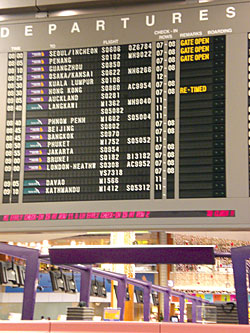 KUNDA DIXIT |
I never knew how famous my country was until I lived in Nepal for five months last year. Everyone, from a bespectacled high school principal to a battle-hardened Maoist guerrilla, seemed to have heard of the tiny island state known as Singapore. "Good economy, very clean," they all said approvingly. Some would even mention Lee Kuan Yew (whose party has ruled Singapore for 50 years and counting).
Friends later told me how turning Nepal into Singapore was a standard election slogan. Evidently such talk was a hit with the masses, and it certainly boosted the fame of a country only roughly the size of the Kathmandu Valley.
But a good economy and clean streets doesn't quite sum up the Singapore I know. As someone born and bred in this tropical nation, I feel compelled to tell Nepalis who want their country transformed into mine: be careful what you wish for.
Imagine a bunch of Singapore's brightest minds taking over Nepal from here on. Initially, things look good. An army of municipal workers cleans out rubbish and filth on the roads. A new fine on spitting and littering is imposed and enforced; many Nepalis get a ticket and grumble about it. But because everyone is so happy about the newly clean streets they accept it and move on.
Meanwhile, employment is rising as construction workers are employed in a massive infrastructure upgrading programme. Again, there is a general sense of optimism as jobs are created and people are working.
But soon, things start to get strange. For one, all worker unions are consolidated into one mega union, and this entity seems more interested in persuading workers to work for longer hours for the same wages than in organising the next strike. For good measure, strikes are outlawed altogether, and demonstrations are also banned.
No more taking to the streets with banners and effigies, no matter how legitimate your grievance is. The armed police force is on hand to deal with anyone who thinks this law is flexible. Yes, the men in camouflage blue actually start doing their job instead of redirecting traffic to facilitate protests. After all, Singapore is where police with batons and shields arrested four people staging a silent, stationary protest in 2005.
Newspapers thinking this is unfair criticise the Singaporean managers in editorials and reports. They are slapped with defamation lawsuits and several close down. A few editors are even arrested on the charge of inciting hatred against the government. Before you know it, licenses are required to publish newspapers, with full discretion of issuance with the communications ministry.
Of course, even in this imaginary world, the Singaporeans can't run the show forever, so Nepali leaders have to step up to the plate. People say Nepal needs a 'developmental dictator' and (in private, at least) Nepali politicians seem to agree. What they don't seem to realise is that the first part is infinitely more important than the second, and that all of them have shown very little interest in the former while displaying an aptitude for the latter.
Still, all that is in the past in the New Singaporean Nepal. No more populist talk from now on. Singaporean leaders are just about the only ones in the world who consistently promise higher taxes and still get elected. No more petty political squabbles either, but of course that's easy if one party completely dominates parliament, like the situation in my country.
Most Nepalis see the shiny skyscrapers, the glitz of a higher standard of living and the promise of a better life when they think of Singapore. It's undeniable that I have enjoyed all these as a Singaporean, but being a citizen here allows me to see the other side. No one talks about the sacrifices - the lack of civil rights, freedom of the press, multi-party democracy, to name a few - that went into the Singapore story.
Are Nepalis ready to make such sacrifices when it has become second nature to take to the streets? More importantly, are the politicians ready to discuss nation building instead of spending time jockeying for power? Something tells me everyone would just spit in disgust at how far-fetched a real Singaporean Nepal would be, with or without the anti-spitting fine.



